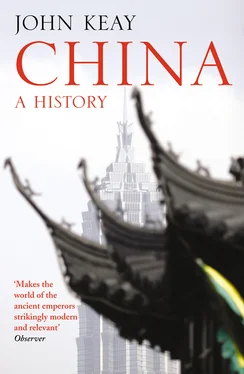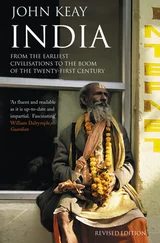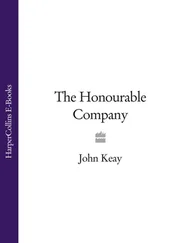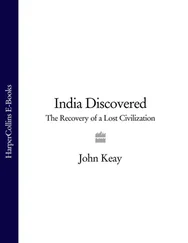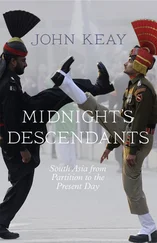A new breed of leader now emerged, the foremost example being Xiang Yu. Another native of Chu but an aristocrat rather than a commoner, descended from a long line of Chu generals, Xiang Yu towered above his contemporaries in both physique and accomplishment. He was foul of temper but fearless in battle, and his men worshipped him. Though historians nurtured in the literary and bureaucratic tradition found nothing remotely romantic in battlefield antics, Xiang Yu would prove an exception. Sima Qian called him arrogant, deceitful and ungrateful, yet could neither disguise his admiration nor resist the sort of detail calculated to enhance a heroic reputation. Xiang Yu strides from the pages of the Shiji like no other warrior; and it is testimony to the Shiji ’s influence that he is still sometimes hailed as the most accomplished general in the whole of Chinese history.
Scenting a once-in-a-lifetime opportunity, other leaders emerged from the masses more like Chen She. Liu Bang of Pei, a district in the north of what had been (and was again) Chu, had also fallen foul of the Qin authorities and taken to brigandage. But while the melancholic Chen She had had to contrive his own portents, and while the mighty Xiang Yu was well enough endowed to manage without them, Heaven of its own volition showered the young Liu Bang with auspicious signs and lucky encounters. Dragons – of all animals the most closely associated with power and celestial favour – featured in many of these manifestations. His mother had conceived him by a dragon, another hovered over him when he slept, and his well-whiskered features were sufficiently dragon-like to excite physiognomists (they foretold your future from your face), one of whom, a certain Lü, was so impressed that he gave him his daughter in marriage. Thus does the Grand Historian waste no time in flagging the future founder of the Han dynasty and his influential consort. Readers are not to be misled by Liu Bang’s limited education, his boorish behaviour and indifferent military record. Heaven’s favour would more than compensate.
Following the death of Chen She, it was the inspirational Xiang Yu who quickly made a name for himself as a commander. He then took over the reconstituted kingdom of Chu, first as the power behind the puppet throne, then as king and eventually as ba (‘hegemon’ or ‘protector’) over a cluster of satellite states. The dragon-blest Liu Bang of Pei, his gang having grown to an army, allied himself with Xiang Yu and his Chu forces. In 207 BC, the year in which the Second Emperor committed suicide and Zhao Gao was murdered, the armies of the now commander-in-chief Xiang Yu inflicted a succession of heavy defeats on the Qin forces, driving them back to the hill passes that guarded the Qin stronghold along the Wei River. ‘The war-cry of Chu shook the heavens, and the men of the other armies all trembled with fear,’ says Sima Qian. 8
Meanwhile Liu Bang of Pei led his men west by way of the Han valley and then north towards Qin. Finding the passes from this direction less well defended, he opened contact with the Qin court at Xianyang, learned of the fall of the Second Emperor, and received some encouragement from the First Emperor’s grandson, who was now the would-be (or more precisely ‘would-rather-not-be’) ‘Third Emperor’. Without consulting his allies, Liu Bang then marched on the capital and took it.
As his superior commander, Xiang Yu was furious. He too thrust towards Xianyang and, threatening to exterminate both the enemy and his ally, encamped his 400,000 men within a day’s march of Liu Bang’s 100,000. It was not just a question of Liu Bang’s insubordination. Rumours of his having made a deal with Xianyang were rife, and they seemed to be borne out by the extraordinary clemency Liu Bang had shown towards Qin’s people and their would-rather-not-be emperor. Such restraint suggested that Liu Bang was both currying favour in Qin and cultivating a reputation for superior virtue, as sure a sign of imperial ambitions as the celestial dragons and tigers that were reported circling over his camp.
To fend off a clash of Qin’s joint conquerors, a reconciliation was attempted by go-betweens. Liu Bang reported to Xiang Yu in person; but even as the liquor flowed and loyalties were reaffirmed, weapons were being fingered by their jumpy retainers. Pretending a weak bladder, Liu Bang excused himself, left the audience tent and failed to return. On learning that he had in fact been smuggled back to his own army in safety, Xiang Yu fell into a towering rage. (Sima Qian has him fuming rather often.) Such wrath could be assuaged only by turning on Xianyang, massacring its inhabitants, torching its palaces and archives (so probably burning more books than Li Si), murdering the now would-definitely-not-be ‘Third Emperor’, and in one of the Shiji ’s several versions of this grisly episode, ‘desecrating the grave of the First Emperor’ – which could account for the shattered state of ‘the terracotta army’.
This action of Xiang Yu’s was particularly reprehensible in that the city had already surrendered, albeit to his rival; and Xiang Yu now compounded his mistake with a string of others. Instead of establishing himself within the natural stronghold that was the state of Qin, he headed back east; trouble was brewing in Shandong, his men were homesick, and Chu’s new capital at Pengcheng awaited its hero. In his absence, the state of Qin was divided into four lesser kingdoms, with Liu Bang being fobbed off with its outlying commanderies in Ba and Shu (Sichuan) plus the neighbouring upper Han valley. Xiang Yu seems to have assumed that, since Sichuan was notoriously a place of exile, relegating his rival to this far-flung region beyond the Qinling range would keep him out of mischief. Liu Bang, or ‘the King of Han’ as he was now to be styled, saw it more as a lucky escape and a safe refuge. To make doubly sure that he was not pursued, he dismantled the carpentry of Stone Cattle Road and other mountain trails behind him.
From this 206 BC appointment of Liu Bang of Pei as king of Han, the Han dynasty would date its foundation and take its name; but it would be another four years of strife and appalling bloodshed before the Han king became the Han emperor. For no sooner had Xiang Yu marched east than Liu Bang marched north again, replacing the mountain road and retaking the Qin heartland.
The titanic struggle that now unfolded would achieve epic status. Thanks to Sima Qian, the protagonists would win such fame that references to the spirit of Xiang Yu or the stamina of Liu Bang would come to rate as conversational clichés. To this day, Chinese chessboards often indicate that one end is for ‘Han’ rather than ‘black’ and the other for ‘Chu’ rather than ‘white’. 9The rules of combat, such as they were, were mutually understood; move by move the game must progress until a king was toppled. But the odds were evenly stacked, and though fortunes would fluctuate, the outcome remained uncertain till the bitter end.
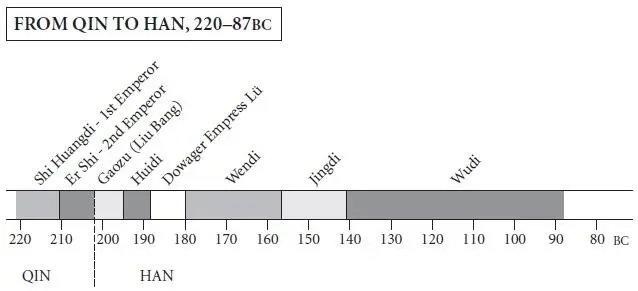
Liu Bang made the opening move. With a secure base in Qin and with the unlimited resources of Sichuan to draw on, he was in the same enviable position as the Qin kings of the ‘Warring States’ period. At the head of an army that had suddenly grown to a no doubt exaggerated 560,000 men, he swept east and took the Chu capital of Pengcheng. Meanwhile Xiang Yu, whose kingdom was more vulnerable to attack from the rear, was quashing opposition far to the east in Shandong. Greeting the news of Liu Bang’s onslaught with his customary outburst, Xiang Yu headed to the rescue. Despite a march of several hundred kilometres and only 30,000 men, he drove back the enemy, reclaimed Pengcheng and won two resounding victories – such was his undoubted genius as a field commander.
Читать дальше
